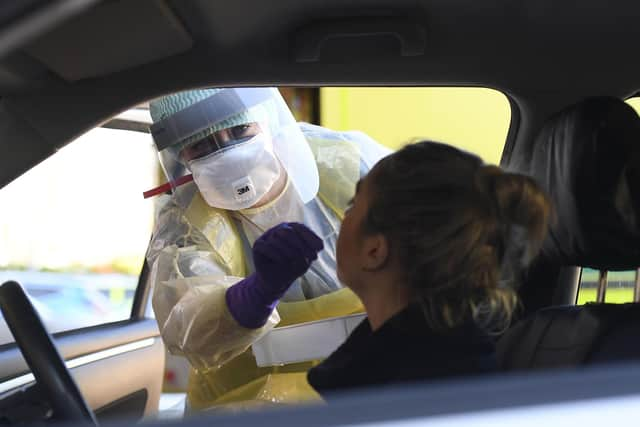Greatest coronavirus risk is to over 60s - Derry GP
and live on Freeview channel 276
Dr Tom Black, chair of the British Medical Association NI Council, said that cases of COVID-19 are expected to hit their peak within weeks, with 95 % of cases expected over a nine week period.
Dr Black said this peak in mid-April will be the “problem” period. “If we are very lucky, the weather might improve and it might die down. It is very obviously contagious, and it is also obvious that it is quite lethal. For a developed part of the world like ours there would be a 1% mortality rate,” he said.
Advertisement
Hide AdAdvertisement
Hide AdHowever, the Derry GP cautioned that those aged 60 and over were much more susceptible to getting very seriously ill or dying, while people with underlying medical problems are also at much greater risk. “The problem with this is that different bugs have different profiles. Young people don’t really get this but older people are very vulnerable. The over 60s are the most vulnerable to the illness itself and how lethal it can be for them. The mortality rate for over 80s is very high at 14%. If you are an older person, avoid anyone who has symptoms, and if you are not well you shouldn’t visit an older relative .”


This, he said, was particularly the case for older people with diabetes, cancer, a heart condition or chronic lung disease. “This is a disease that is going to kill older people, and for younger people it won’t be as lethal. Don’t visit elderly relatives, stay away from them if you have symptoms. If your children are sick, don’t take them to visit granny. Children will cope with it, but granny or granda might not.”
Some of the symptoms of coronavirus are very similar to various other conditions such as the flu or a common cold, but people are advised not to take a chance. Symptoms include a cough, a high temperature, and shortness of breath.
As of yesterday there were three confirmed cases in the north and a further 13 in the south, with those numbers likely to increase in the coming days, and more people currently being tested.
Advertisement
Hide AdAdvertisement
Hide AdMany local shops have seen antibacterial hand gels and wipes as well as face masks being snapped up by shoppers as soon as they are restocked.


Dr Black said that GPs across the region have noticed a significant increase in enquiries regarding COVID-19, including people who have had contact or second hand contact, people feeling ill, and those people planning to travel and seeking advice.
Local people, he said, were extremely well informed. “I think it has caught the public imagination. It has got through to people.
“People are aware and are not shaking hands, and many are heeding the advice regarding washing their hands frequently and keeping their hands away from their face, covering your mouth when coughing, and following the ‘catch it, bin it, kill it’ advice.”
Advertisement
Hide AdAdvertisement
Hide AdIn December 2019, a new strain of coronavirus (COVID-19) was first identified in Wuhan City, China and has since gone global.
Health officials have advised travellers who have visited countries considered to be at higher risk to self-isolate, stay indoors at home and call the NHS helpline on 111 for advice, even if they don’t have symptoms, if they have recently travelled from Hubei province in China, Iran, Daegu Metropolitan City and Cheongdo County in South Korea, or affected regions in north Italy.